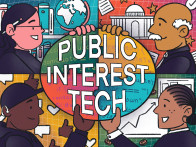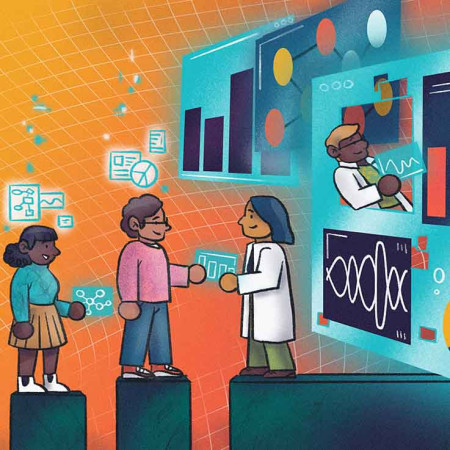-
sponsored
Co-Powering an Emergent Horizon
The public is not a monolith—it’s an interdependent ecosystem of communities who must determine the tools for a more caring future.
-
sponsored
Advancing Climate Justice Priorities Over Profit-Led Research
Through intentional investments and informed divestments, investors, philanthropists, and foundations can support environmentally conscious, community-centered, and reparative approaches to economic and technological change.
-
sponsored
The Good Web
It’s not enough to fix existing social media, we must imagine, experiment with, and build social media that can be good for society.
-
sponsored
How Public Interest Technologists Power Human Rights in the Global South
Stories from Mozilla and Ford’s Tech & Society Fellowship, plus five lessons for funders.
-
sponsored
A Technologist Walks Into the US Government
Why representation, resources, and mentorship matter most when growing a diverse community of public interest technologists.
-
sponsored
Disrupting the Gospel of Tech Solutionism to Build Tech Justice
To create just, equitable, and self-determined tech futures that work for everyone, we need to center and support voices from the communities most impacted by tech’s biases and harms. A more just tech future requires deep investment in people to make space for visioning and creation, not simply tech solutions.
-
sponsored
Justice by the Numbers
An innovative partnership between lawyers for the ACLU of Massachusetts and public interest technologist Paola Villarreal resulted in the single largest dismissal of wrongful convictions in US history.
-
sponsored
AI Ethics Are in Danger. Funding Independent Research Could Help
For technology to truly work in the public interest, we need to invest in building organizations that are free from corporate profit motives and that respect, integrate, and compensate communities with whom they work. We offer a new path forward for AI research.
-
sponsored
Public Interest Tech Has a Pipeline Problem
Tech companies that prioritize the public interest are essential for a more just future, but they need investments at their earliest stages to thrive.
-
sponsored
Funding Data and AI That Serve the Social Sector
Five ways for funders to think about investing in data and AI that would put ownership of responsible data and AI squarely in the hands of the social sector.
-
sponsored
Public Interest Technology: Bridge to the Future
Two leaders from business and philanthropy share recommendations for building stronger internal teams and a cross-sector ecosystem focused on designing technology with the needs of the public in mind.
-
sponsored
Keys to Unlocking an Inclusive and Just Tech Future
Developing technology in the public interest starts with inviting the knowledge and experiences of marginalized communities into the public discourse.
-
sponsored
How Funders Can Help Fill Critical Gaps in Technology for Social Good
Why we need cross-sector physical, social, and digital assets to undergird next-gen technologies and how philanthropy can help fuel an equitable innovation ecosystem.
-
sponsored
Focusing Government Service Delivery on a New North Star
By investing in a talent pipeline of diverse public interest technologists, government and philanthropy can advance equity, expand opportunity, and make democracy work for the people.
-
SERIES INTRODUCTION
sponsored
Building the Public Interest Technology Infrastructure of the Future
How a robust public interest technology field can overcome historical inequities and ensure that everyone can fully benefit from technology.

sponsored
Putting the Public Interest in Front of Technology
In the past 30 years, digital communications and data-driven technologies have transformed how we connect and engage with the world around us, creating opportunities in every area of contemporary life. But as often as these technologies foster learning and create opportunity, they have also been used in ways that amplify systemic inequities.
Policy makers are struggling to regulate everything from AI-operated phones to advertising models. Tech producers are incentivized to maximize profitability. Consumers enthusiastically adopt new apps and services, often without understanding the adverse consequences they entail. As a result, everything from privacy and justice, to teen mental health and the ability to distinguish truth from fiction, are becoming casualties in the race to create and deploy new tech.
Marginalized communities often bear the brunt of technology’s adverse consequences, whether through biased algorithms that determine Black patients need less pain medication than white counterparts or through extensive surveillance programs that track undocumented immigrants. What’s clear is that the solution to these challenges lies not only in an approach focused on developing tech for good but in always asking, “good for who?”
The Ford Foundation’s technology and society program has spent more than a decade working with the talented technologists, researchers, leaders, and advocates who are asking these questions at scale through a pioneering new field: public interest technology.
Public interest technology is an interdisciplinary approach that demands technology be designed, deployed, and regulated in a responsible and equitable way. That’s why public interest technologists—engineers, scientists, community organizers, activists—explicitly center the experiences of historically marginalized groups who have been both targeted and neglected by technology.
Over the course of this series, sponsored by the Ford Foundation, some of the sharpest minds in this field will explore why and how advancing public interest technology will function best with widespread participation, particularly across four key sectors: academia, civil society, private and public sectors. In an increasingly interconnected global ecosystem, progress toward effective standards and regulations that protect the public must map to global consumer and human rights frameworks. Creating and distributing technology that works for all is an imperative for technologists, social entrepreneurs, business leaders, philanthropists, civil society leaders, and academics in our institutions across the globe.
(Series illustrations by Vreni Stollberger)
















